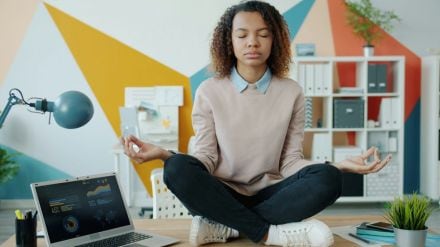World Mental Health Day 2025: In the fast-paced everyday routine with endless work hours and non-existent breaks, stress can build up silently, affecting mental health. When not mindful of how the body and mind are reacting to stressful triggers, over time, burnout can set in, manifesting in anxiety, irritability, and lost focus. Chronic stress can also impact immunity, making one more susceptible to infections and reducing productivity.
Small mindfulness movements throughout the day can help manage stress before it becomes a health problem. A little bit of stretching, walking, deep breathing, and taking micro breaks is all that you need to do to find your calm. Financial Express.com spoke to experts to understand how professionals can find a few moments of mindfulness and peace amid the hectic work routine.
The power of micro movements and mini breaks
“In today’s sedentary work culture, we often underestimate the power of movement, and of conscious mini-breaks through our workday. You don’t need an intense workout to feel better; even short, mindful physical breaks can be helpful,” says Ruchir Sodhani, Mental Health and Wellness Counsellor, CK Birla Hospitals, Jaipur.
Doing a couple of stretches at your desk, moving should neck and shoulders, or even a few seconds of deep breathing can help break the monotony, and allow your brain to take a break from the constant grind.
Clearing the brain clutter
These small movements can go a long way in reducing brain clutter and making us more composed before tackling the next task, says Sodhani. “Using physical time-outs each time we check off one thing from our to-do list can significantly improve our mood, focus, and emotional balance,” he says.
Dr Partap Chauhan, Ayurveda Expert and Director, Jiva Ayurveda, shares micro workouts for mindfulness on the occasion of World Mental Health Day.
Desk Yoga
If your chair has become your constant companion, desk yoga is an easy way to unwind. Start with gentle neck rolls, shoulder rotations, and slow spinal twists. These simple moves release trapped energy that builds up when you sit for too long. Interlace your fingers, stretch your arms upwards, and take a deep breath. You will notice a change almost instantly.
Dr Chauhan notes that many people think exercise is purely physical, but the nervous system reacts immediately to movement. Even five minutes of stretching at your desk can shift your mood and sharpen your concentration.
Walking meetings
Walking meetings are more than a passing corporate trend. They bring together mild exercise, open conversation, and fresh air. The steady rhythm of walking improves circulation, enhances focus, and subtly uplifts mood. Ayurveda recognises walking as a grounding movement that helps reduce mental fatigue and balance vata.
Try taking calls while walking or stepping outside after lunch for a few minutes. The pace of your steps naturally aligns with your breath, bringing a quiet order to your thoughts and easing mental restlessness.
Breathing breaks
Your breath reflects your state of mind. Fast and shallow breathing often reflects stress, while slow, steady breaths promote calm. Even two minutes of deep breathing can lower stress hormones and clear the mind.
A simple practice, such as alternate-nostril breathing, helps. Sit straight, close one nostril with your thumb, inhale through the other, then switch. This technique steadies emotions and clears the tiredness that accumulates from constant screen exposure.
Micro movements
Standing and stretching every half-hour, rotating your wrists and ankles while reading emails, rubbing your palms and placing them gently over your eyes to relax them, and doing a seated forward bend to release lower-back tension can help relieve stress.
In short, if you don’t have time to head to gym, make small movements for companion to breathe easy and release stress.
